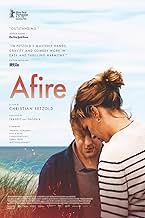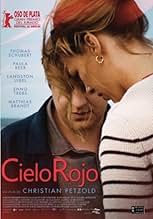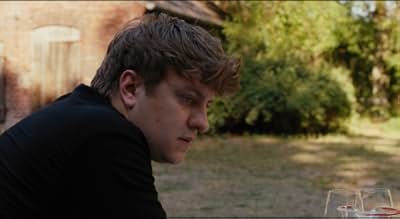NOTE IMDb
7,1/10
10 k
MA NOTE
Un groupe d'amis dans une maison de vacances au bord de la mer Baltique où les émotions sont fortes lorsque la forêt desséchée qui les entoure prend feu.Un groupe d'amis dans une maison de vacances au bord de la mer Baltique où les émotions sont fortes lorsque la forêt desséchée qui les entoure prend feu.Un groupe d'amis dans une maison de vacances au bord de la mer Baltique où les émotions sont fortes lorsque la forêt desséchée qui les entoure prend feu.
- Réalisation
- Scénario
- Casting principal
- Récompenses
- 10 victoires et 28 nominations au total
Avis à la une
Director Christian Petzold (PHOENIX, TRANSIT) appears to be in a slightly different mode at first with his latest, AFIRE. Four people gather at a seemingly idyllic summer retreat in the Baltics.
The home is owned by the family of Felix (Langston Uibel). He and his friend Leon (Thomas Schubert) discover that a young woman has sublet a bedroom as well, Nadja (played by Petzhold regular, Paula Beer). A local lifeguard Deved (Enno Trebs) completes the quartet. Leon is there to work on a rewrite of his novel, while Felix is completing a portfolio of photographs.
Petzold has said that he found inspiration in the work of Eric Rohmer and one can certainly see the influence as the characters go through their paces and engage in barbed conversations and behaviors. The original German title translates roughly as 'Red Skies' and refers to the crimson glow from nearby forest fires in the region.
Petzold's script takes a bit to come into focus and is impeded by the character of Leon, a petulant sort who is neither sympathetic nor particular interesting for much of the action. Schubert's performance similarly is off-putting at first and never quite makes him worthy of much investment. Fortunately, Beer is her dependable self and keeps the film moving along, all the while revealing layers of her character. Uibel and Trebs are fine as is Matthias Brandt as Leon's literary editor.
AFIRE has an appropriate denouement (if a bit on the nose) and Petzhold delivers one last mischievous wink to the viewer.
The home is owned by the family of Felix (Langston Uibel). He and his friend Leon (Thomas Schubert) discover that a young woman has sublet a bedroom as well, Nadja (played by Petzhold regular, Paula Beer). A local lifeguard Deved (Enno Trebs) completes the quartet. Leon is there to work on a rewrite of his novel, while Felix is completing a portfolio of photographs.
Petzold has said that he found inspiration in the work of Eric Rohmer and one can certainly see the influence as the characters go through their paces and engage in barbed conversations and behaviors. The original German title translates roughly as 'Red Skies' and refers to the crimson glow from nearby forest fires in the region.
Petzold's script takes a bit to come into focus and is impeded by the character of Leon, a petulant sort who is neither sympathetic nor particular interesting for much of the action. Schubert's performance similarly is off-putting at first and never quite makes him worthy of much investment. Fortunately, Beer is her dependable self and keeps the film moving along, all the while revealing layers of her character. Uibel and Trebs are fine as is Matthias Brandt as Leon's literary editor.
AFIRE has an appropriate denouement (if a bit on the nose) and Petzhold delivers one last mischievous wink to the viewer.
"Leon" (Thomas Schubert) and his friend "Felix" (Langston Uibel) head to a remote rural cottage near the Baltic coast so the former man can put the finishing touches to his novel before a visit from his publisher (Matthias Brandt). They arrive, though, and discover that "Nadja" (Paula Beer) is already staying - and this upsets the apple cart a bit. "Leon" quickly becomes obsessed - and that only gets worse when her nocturnal activities with life guard "Devid" (Enno Trebs) and some wafer thin walls force him to sleep in the garden amongst the mosquitoes. What now ensues is quite an intricately constructed observational presentation that looks at the evolving dynamic between the four - and it doesn't pan out as you might expect, especially once it becomes clear that his latest literary work is nobody's idea of a magnum opus. The characterisations here have a fluidity to them that makes for quite an interesting watch. None of them could ever be described as beautiful - in any classical sense - so the story is much more about their traits, flaws and foibles than about their looks. That works up to a point, but there was too much missing from the puzzle for me to really find myself engaged with any of them. The last twenty minutes - set amidst some lethal forest fires - was rushed and seemed to me indicative that "Leon" wasn't the only one who'd suffered from a writer's block! The photography is effectively intimate at times but at other times we see just too many shots walking to and from the beach (and the constant buzzing of the mozzies got on my nerves a bit, too, after a while!). I did quite enjoy this, but somehow it just lacked substance before a conclusion that just seemed to be unnecessarily ghastly. Give it a go, though...
In interviews director Christian Petzold gave in connection with the release of "Roter Himmel" he said that he was inspired by French summer / coming of age films from for example Eric Rohmer. According to Petzold this type of film had disappeared out of German cinema since "Menschen am Sonntag" (1930, Robert Siodmak, Edgar Ulmer and Rochus Gliese). "Roter Himmel" is indeed situated during summer, but that is where any comparison ends. The beginning of "Roter Himmel" is much more a parody on the American style coming of age films such as "The cabin in the woods" (2011, Drew Goddard) with a car breaking down in the woods and creepy animal noices thereafter.
"Barbara" (2012, Christian Petzold) was still an explicit political movie about living in the DDR. Since then the films of Petzold have remained socially concerned but have become more abstract. In "Undine" (2020) a water nymph symbolizes the element of water. In "Roter Himmel" forest fires sumbolizes the element of fire. It looks like Petzold has begun a series about the elements, just like Krzysztof Kieslowski made a series about the ideals of the French revolution in the 90's. We are looking forward to the next film.
Forst fires are unfortunately very actual in the summer of 2023. However these fires are not the main theme of the film. "Roter Himmel" is not an eco-drama. They remain on the background, at least that is what we and the characters in the film belief for (too) long.
The main character of the film is Leon (Thomas Schubert), a writer writing his second book and desperately trying to match the success of his first novel. He wraps his uncertainty in a cloak of arrogance and self esteem and in so doing gets estranged from the people around him. These people are for him more an obstacle for working undisturbed than a source of inspiration. When they go for a swim he always says that his work doesn't allow him to join them, only to waste his time when they are gone.
An important moment in the film comes when the publisher of Leon meets him to discuss the progress of his work. He doesn't like the manuscript, but he is very interested in what the people around Leon are doing. Will Leon's eyes finally open?
"Barbara" (2012, Christian Petzold) was still an explicit political movie about living in the DDR. Since then the films of Petzold have remained socially concerned but have become more abstract. In "Undine" (2020) a water nymph symbolizes the element of water. In "Roter Himmel" forest fires sumbolizes the element of fire. It looks like Petzold has begun a series about the elements, just like Krzysztof Kieslowski made a series about the ideals of the French revolution in the 90's. We are looking forward to the next film.
Forst fires are unfortunately very actual in the summer of 2023. However these fires are not the main theme of the film. "Roter Himmel" is not an eco-drama. They remain on the background, at least that is what we and the characters in the film belief for (too) long.
The main character of the film is Leon (Thomas Schubert), a writer writing his second book and desperately trying to match the success of his first novel. He wraps his uncertainty in a cloak of arrogance and self esteem and in so doing gets estranged from the people around him. These people are for him more an obstacle for working undisturbed than a source of inspiration. When they go for a swim he always says that his work doesn't allow him to join them, only to waste his time when they are gone.
An important moment in the film comes when the publisher of Leon meets him to discuss the progress of his work. He doesn't like the manuscript, but he is very interested in what the people around Leon are doing. Will Leon's eyes finally open?
The plot is very disorienting. There is a huge deadly forest fire and yet mere minutes away these people are going about their recreational and artistic pursuits without issue. The fire keeps pendulating between being the driving force of the plot and being an ignored inconvenience.
The characters are all mildly uncanny. If there is an artistic message in their personae then it must have been too esoteric for me to pick up while watching.
The storyline felt like it may have been a symbol for the ideation of the film. Keep writing literary nonsense while being an unlikeable detached egotist until you finally chance upon something passable... Unfortunately, the protagonist is so egotistical that when he tries self reflection he actually somehow becomes more egotistical! So I have to confess bewilderment at what the message is supposed to be.
The characters are all mildly uncanny. If there is an artistic message in their personae then it must have been too esoteric for me to pick up while watching.
The storyline felt like it may have been a symbol for the ideation of the film. Keep writing literary nonsense while being an unlikeable detached egotist until you finally chance upon something passable... Unfortunately, the protagonist is so egotistical that when he tries self reflection he actually somehow becomes more egotistical! So I have to confess bewilderment at what the message is supposed to be.
The actor Thomas Schubert deserves much of the credit for making "Afire" work as well as it does.
He plays a self-absorbed, petty, insecure writer who's so myopically obsessed with the book he's writing that he's oblivious to the world around him. In other hands, it would be a big ask of the audience to spend two hours with such a tiring character, especially since he's in virtually every scene of the movie. But Schubert is able to make this character not only tolerable, but relatable. We're all guilty of missing the bigger picture because of our individual preoccupations.
The ending of "Afire" feels a bit overly dramatic. It's like something that would feel right at home in one of those Southern gothic plays by Tennessee Williams or Eugene O'Neill. But I did enjoy the irony of its conclusion -- once our main character starts paying attention to the trauma around him, it's something he uses to write better books.
Grade: A.
He plays a self-absorbed, petty, insecure writer who's so myopically obsessed with the book he's writing that he's oblivious to the world around him. In other hands, it would be a big ask of the audience to spend two hours with such a tiring character, especially since he's in virtually every scene of the movie. But Schubert is able to make this character not only tolerable, but relatable. We're all guilty of missing the bigger picture because of our individual preoccupations.
The ending of "Afire" feels a bit overly dramatic. It's like something that would feel right at home in one of those Southern gothic plays by Tennessee Williams or Eugene O'Neill. But I did enjoy the irony of its conclusion -- once our main character starts paying attention to the trauma around him, it's something he uses to write better books.
Grade: A.
Le saviez-vous
- AnecdotesChristian Petzold binged the films of Éric Rohmer while developing this project.
- ConnexionsReferenced in Film Junk Podcast: Episode 929: Perfect Days + I.S.S. (2024)
- Bandes originalesIn My Mind
Performed by Wallners
Meilleurs choix
Connectez-vous pour évaluer et suivre la liste de favoris afin de recevoir des recommandations personnalisées
- How long is Afire?Alimenté par Alexa
Détails
Box-office
- Montant brut aux États-Unis et au Canada
- 244 803 $US
- Week-end de sortie aux États-Unis et au Canada
- 38 485 $US
- 16 juil. 2023
- Montant brut mondial
- 2 295 497 $US
- Durée
- 1h 42min(102 min)
- Couleur
- Rapport de forme
- 1.85 : 1
Contribuer à cette page
Suggérer une modification ou ajouter du contenu manquant














